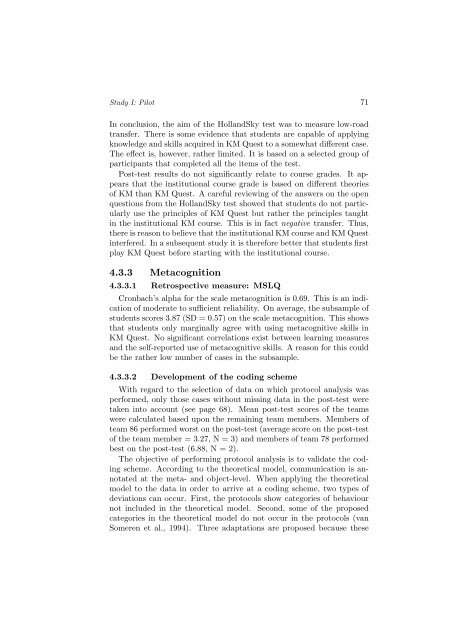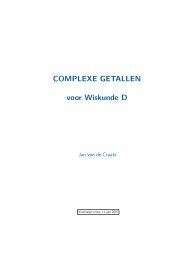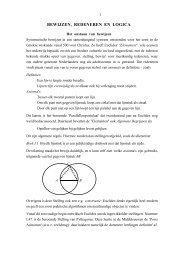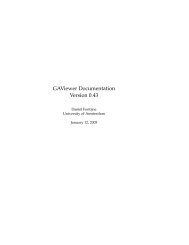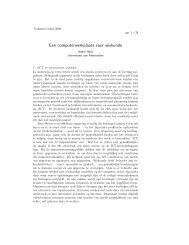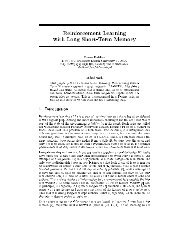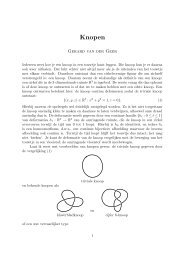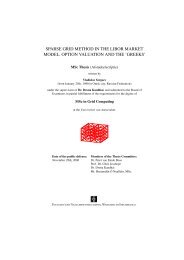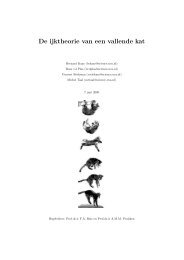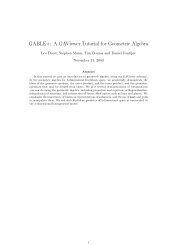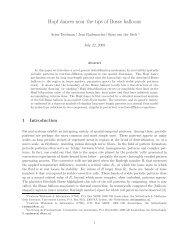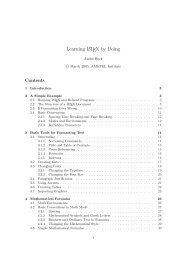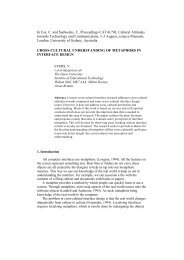The role of metacognitive skills in learning to solve problems
The role of metacognitive skills in learning to solve problems
The role of metacognitive skills in learning to solve problems
Create successful ePaper yourself
Turn your PDF publications into a flip-book with our unique Google optimized e-Paper software.
Study I: Pilot 71<br />
In conclusion, the aim <strong>of</strong> the HollandSky test was <strong>to</strong> measure low-road<br />
transfer. <strong>The</strong>re is some evidence that students are capable <strong>of</strong> apply<strong>in</strong>g<br />
knowledge and <strong>skills</strong> acquired <strong>in</strong> KM Quest <strong>to</strong> a somewhat different case.<br />
<strong>The</strong> effect is, however, rather limited. It is based on a selected group <strong>of</strong><br />
participants that completed all the items <strong>of</strong> the test.<br />
Post-test results do not significantly relate <strong>to</strong> course grades. It appears<br />
that the <strong>in</strong>stitutional course grade is based on different theories<br />
<strong>of</strong> KM than KM Quest. A careful review<strong>in</strong>g <strong>of</strong> the answers on the open<br />
questions from the HollandSky test showed that students do not particularly<br />
use the pr<strong>in</strong>ciples <strong>of</strong> KM Quest but rather the pr<strong>in</strong>ciples taught<br />
<strong>in</strong> the <strong>in</strong>stitutional KM course. This is <strong>in</strong> fact negative transfer. Thus,<br />
there is reason <strong>to</strong> believe that the <strong>in</strong>stitutional KM course and KM Quest<br />
<strong>in</strong>terfered. In a subsequent study it is therefore better that students first<br />
play KM Quest before start<strong>in</strong>g with the <strong>in</strong>stitutional course.<br />
4.3.3 Metacognition<br />
4.3.3.1 Retrospective measure: MSLQ<br />
Cronbach’s alpha for the scale metacognition is 0.69. This is an <strong>in</strong>dication<br />
<strong>of</strong> moderate <strong>to</strong> sufficient reliability. On average, the subsample <strong>of</strong><br />
students scores 3.87 (SD = 0.57) on the scale metacognition. This shows<br />
that students only marg<strong>in</strong>ally agree with us<strong>in</strong>g <strong>metacognitive</strong> <strong>skills</strong> <strong>in</strong><br />
KM Quest. No significant correlations exist between learn<strong>in</strong>g measures<br />
and the self-reported use <strong>of</strong> <strong>metacognitive</strong> <strong>skills</strong>. A reason for this could<br />
be the rather low number <strong>of</strong> cases <strong>in</strong> the subsample.<br />
4.3.3.2 Development <strong>of</strong> the cod<strong>in</strong>g scheme<br />
With regard <strong>to</strong> the selection <strong>of</strong> data on which pro<strong>to</strong>col analysis was<br />
performed, only those cases without miss<strong>in</strong>g data <strong>in</strong> the post-test were<br />
taken <strong>in</strong><strong>to</strong> account (see page 68). Mean post-test scores <strong>of</strong> the teams<br />
were calculated based upon the rema<strong>in</strong><strong>in</strong>g team members. Members <strong>of</strong><br />
team 86 performed worst on the post-test (average score on the post-test<br />
<strong>of</strong> the team member = 3.27, N = 3) and members <strong>of</strong> team 78 performed<br />
best on the post-test (6.88, N = 2).<br />
<strong>The</strong> objective <strong>of</strong> perform<strong>in</strong>g pro<strong>to</strong>col analysis is <strong>to</strong> validate the cod<strong>in</strong>g<br />
scheme. Accord<strong>in</strong>g <strong>to</strong> the theoretical model, communication is annotated<br />
at the meta- and object-level. When apply<strong>in</strong>g the theoretical<br />
model <strong>to</strong> the data <strong>in</strong> order <strong>to</strong> arrive at a cod<strong>in</strong>g scheme, two types <strong>of</strong><br />
deviations can occur. First, the pro<strong>to</strong>cols show categories <strong>of</strong> behaviour<br />
not <strong>in</strong>cluded <strong>in</strong> the theoretical model. Second, some <strong>of</strong> the proposed<br />
categories <strong>in</strong> the theoretical model do not occur <strong>in</strong> the pro<strong>to</strong>cols (van<br />
Someren et al., 1994). Three adaptations are proposed because these


